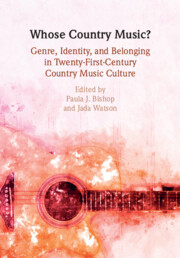Book contents
- Whose Country Music?
- Whose Country Music?
- Copyright page
- Contents
- Figures
- Tables
- Contributors
- “She went to Nashville to sing country music”
- Part I Industry
- Part II Codes of Conduct
- 5 Why Country Music Needs Latina Feminism
- 6 Pistol Annies
- 7 From Bros to Gentlemen
- 8 Cowboys on a Beach
- Part III Authenticity
- Part IV Boundary Work
- Bibliography
- Index
7 - From Bros to Gentlemen
The Problem of Consent in Contemporary Country Music
from Part II - Codes of Conduct
Published online by Cambridge University Press: 03 February 2023
- Whose Country Music?
- Whose Country Music?
- Copyright page
- Contents
- Figures
- Tables
- Contributors
- “She went to Nashville to sing country music”
- Part I Industry
- Part II Codes of Conduct
- 5 Why Country Music Needs Latina Feminism
- 6 Pistol Annies
- 7 From Bros to Gentlemen
- 8 Cowboys on a Beach
- Part III Authenticity
- Part IV Boundary Work
- Bibliography
- Index
Summary
Themes of contemporary country music during the 2010s moved from “bro-country” songs promoting alcohol consumption, partying, and hook-up culture, toward tracks outlining consensual, presumed heterosexual, romantic relationships. Close listening to these “gentlemanly” songs reveals a specter of coercion, raising questions about the nature of consent. Using music by Sam Hunt and Thomas Rhett as case studies, this chapter investigates how male country artists represent romantic relationships as an idealized goal where consent is implied rather than expressly indicated. Case studies unravel how silent partners are pressurized and narrators hear or assume “yes” where no consent is offered. Investigations of songs by chart-dominating male country artists allow us to notice how and when in these songs women’s voices may be heard, silenced, or made irrelevant. Applicable beyond just country music, this chapter offers a means for understanding how the idea of consent manifests within popular musics more broadly.
- Type
- Chapter
- Information
- Whose Country Music?Genre, Identity, and Belonging in Twenty-First-Century Country Music Culture, pp. 102 - 115Publisher: Cambridge University PressPrint publication year: 2022

